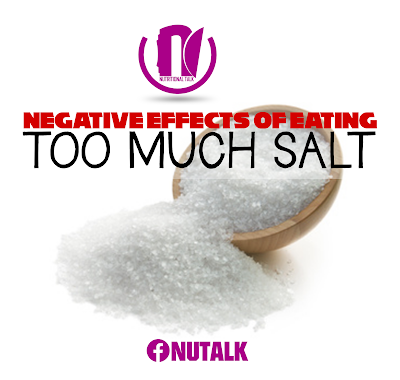Table
Salt is Sodium Chloride (NaCl) which is makes available to the body the
electrolyte, Sodium (Na) when ingested.
The electrolyte sodium (Na) has numerous functions including:
1.
Helps in the maintenance of body
fluid balance (a balance between the extracellular and intracellular fluids).
2. Plays an important part in muscle contraction.
2. Plays an important part in muscle contraction.
3. Aids in
the digestive absorption of nutrients like amino acids and glucose.
4. Helps in the neuron-transmission of impulses.
Nevertherless, tha amount of salt one consumes can become an issue with over-ingesting
of salt leading to numerous unhealthy bodily effects.
An
individual is allowed to ingest up to 1500 milligrams of sodium (Na) daily. This amount can be gotten from consuming 3
grams of salt daily (Approximately two tablespoonful).
Now
let’s go straight into identifying these unhealthy/harmful effects of the
ingestion/consuming of too much salt.
WATER/FLUID RETENTION
As
indicated above, Sodium in salt plays a very significant part in maintaining
fluid balance in the body of every person. Sodium is present in the
extracellular fluid (fluids outside/surrounding the cells of the body) and
together with potassium (predominantly present in intracellular fluids/cells)
guards against water/fluid retention. The kidney in its function of excretion
makes sure concentration of any electrolyte in extracellular fluid is at safe
levels. Thus, consuming too much salt leads to an unhealthy increase in the
concentration of Sodium (Na) in the extracellular fluids. The kidney in its
quest to reduce the Sodium (Na) concentration reduces the amount of water it
usually excretes in as part of urine. This leads to increase in blood volume
and symptoms include edema/swelling on
various parts of your body.
DEHYDRATION/EXSTREME THIRST
For
the kidneys to play-out the function of retaining water in its effort to
balance the Sodium (Na) concentration in the extracellular fluid, there must
enough water available. In the absence of enough water as a result of not been
well hydrated and/or the presence of a disorder that causes excretion of so
much water in urine, the body in its balancing/dilution quest may rely on
intracellular fluids by pulling water/fluids from cells. This has serious
health implications as the optimum function of such cells will be impaired. The activity can cause you to experience
extreme thirst, stomach cramps/pains, dizziness, nausea, diarrhea and vomiting.
DISORDERS/DISEASES
Hypertension: As
indicated above, the cut-back in the amount of water excreted by the kidney
leads to an accompanying dilution of the blood and a resultant increase in
blood volume. Just as in the event of a flood in your community, an increase in
the blood volume causes an increase in the blood pressure. Continuous
over-consumption of too much salt, leads to a repeated increase in blood
pressure and subsequent probable damages to blood vessel walls leading to high blood
pressure or hypertension.
Stomach Ulcer: Repeated
episodes of excessive salt consumption causes damage to the protective lining
of the stomach (mucus) and this eventually increases the stomach’s
susceptibility to Helicobacter pylori (the bacterium scientifically proven to
cause inflammation and sours of the
stomach walls).
Osteoporosis: Chronic over ingestion salt leads to
demineralization of the bone as the body tries to replace the large amount of
excreted calcium. This will ultimately lead to weakened bones.
Kidney Stones: Over
excretion of calcium as result of excessive salt consumption may lead to the
formation kidney stones.
Kidney failure: As explained to detail above, over ingestion of salt tempers with the optimal functioning of the kidney as whole and thus chronic propagation of this while lead to damage to one's kidneys.
Kidney failure: As explained to detail above, over ingestion of salt tempers with the optimal functioning of the kidney as whole and thus chronic propagation of this while lead to damage to one's kidneys.
CONCLUSION
Let
the amount of salt you add to your meals be reasonably healthy and you may not
experience any of the above effects but, on the long term as you become older
your health will be compromised.
FOR
CONSULTATION
Call Our Nutritionist- +233277279565
Or inbox NUTALK on
FACEBOOK
This article was reviewed on Tuesday, 23rd July, 2016 By Nu. Sallah Stanley Kwesi (Nutritionist at Nutritional Talk)
This article was reviewed on Tuesday, 23rd July, 2016 By Nu. Sallah Stanley Kwesi (Nutritionist at Nutritional Talk)
LINK TO THIS POST | COPY
BELOW
http://nwg-works.blogspot.com/2013/05/negative-effects-of-consuming-too-much_27.html
SHORT URL
https://goo.gl/RHgNcS

